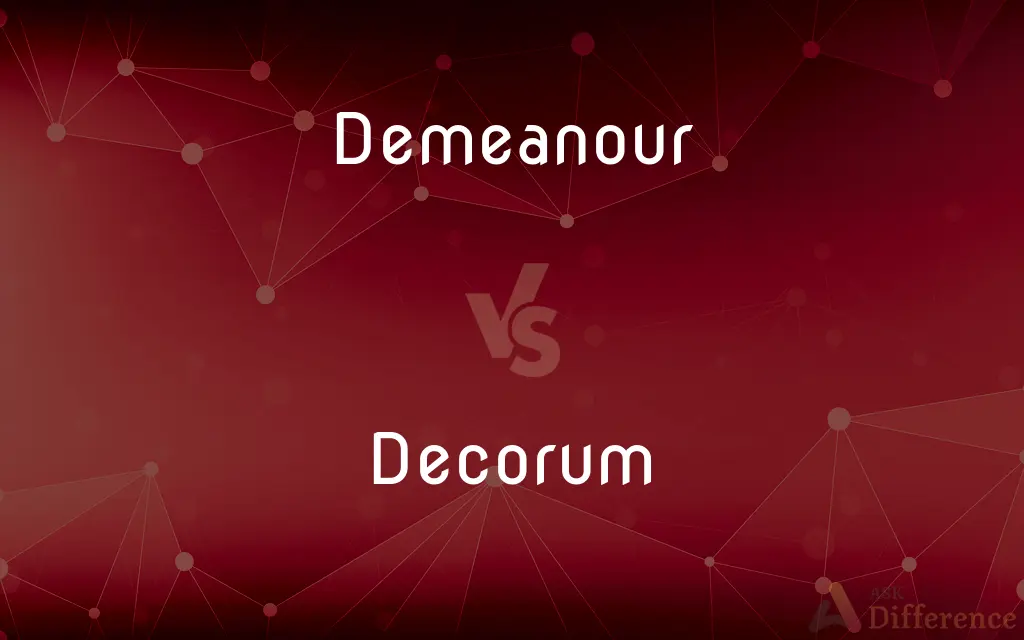Demeanour vs. Decorum — What's the Difference?
By Urooj Arif & Fiza Rafique — Updated on May 18, 2024
"Demeanour" refers to a person's outward behavior or manner, while "decorum" refers to proper and polite conduct, adhering to social norms.

Difference Between Demeanour and Decorum
Table of Contents
ADVERTISEMENT
Key Differences
"Demeanour" is the way a person behaves or presents themselves outwardly. It encompasses a person's attitudes, gestures, expressions, and overall manner. "Decorum," on the other hand, refers to appropriate and proper behavior according to societal or cultural standards. It involves adhering to rules of etiquette and maintaining a level of politeness and propriety in various situations.
While demeanour is a reflection of an individual's personal traits and behavior, decorum is about conforming to external standards and expectations. Demeanour is inherent and can be spontaneous, whereas decorum is often learned and situational.
A person's demeanour can impact how their adherence to decorum is perceived. For example, someone with a respectful demeanour is likely to be seen as naturally possessing good decorum. Conversely, someone who lacks proper decorum may be perceived negatively regardless of their personal demeanour.
In social interactions, observing both demeanour and decorum can be crucial. Demeanour helps in understanding the individual's personality, while decorum ensures that interactions remain respectful and within accepted norms.
Comparison Chart
Definition
Outward behavior or manner
Proper and polite conduct
ADVERTISEMENT
Focus
Individual's attitudes and expressions
Adherence to social norms and etiquette
Nature
Inherent and spontaneous
Learned and situational
Example
Calm and friendly demeanor
Proper behavior at a formal event
Impact
Reflects personal traits
Ensures respectful and appropriate interactions
Compare with Definitions
Demeanour
General appearance and conduct.
The teacher's strict demeanour kept the students in line.
Decorum
Adherence to social norms and etiquette.
She was praised for her decorum at the formal dinner.
Demeanour
Attitude reflected in behavior.
Despite his casual demeanour, he takes his work very seriously.
Decorum
Respectful and courteous behavior.
The students were taught the importance of decorum in public settings.
Demeanour
The way a person behaves towards others.
His polite demeanour made him well-liked by his colleagues.
Decorum
Appropriate conduct for specific situations.
The manager's lack of decorum at the meeting was surprising.
Demeanour
Outward behavior or manner.
Her calm demeanour helped to ease the tension in the room.
Decorum
Proper and polite behavior.
The guests were expected to maintain decorum throughout the ceremony.
Demeanour
Mannerisms and expressions.
The child's cheerful demeanour brightened everyone's day.
Decorum
Decorum (from the Latin: "right, proper") was a principle of classical rhetoric, poetry and theatrical theory concerning the fitness or otherwise of a style to a theatrical subject. The concept of decorum is also applied to prescribed limits of appropriate social behavior within set situations.
Demeanour
Alternative spelling of demeanor
Decorum
Appropriateness of behavior or conduct; propriety
"In the Ireland of the 1940's ... the stolidity of a long, empty, grave face was thought to be the height of decorum and profundity" (John McGahern).
Demeanour
(behavioral attributes) the way a person behaves toward other people
Decorum
Decorums The conventions or requirements of polite behavior
The formalities and decorums of a military funeral.
Decorum
The appropriateness of an element of an artistic or literary work, such as style or tone, to its particular circumstance or to the composition as a whole.
Decorum
(uncountable) Appropriate social behavior.
Decorum
(countable) A convention of social behavior.
Decorum
Propriety of manner or conduct; grace arising from suitableness of speech and behavior to one's own character, or to the place and occasion; decency of conduct; seemliness; that which is seemly or suitable.
Negligent of the duties and decorums of his station.
If your masterWould have a queen his beggar, you must tell him,That majesty, to keep decorum, mustNo less beg than a kingdom.
Decorum
Propriety in manners and conduct
Decorum
Behavior in accordance with established standards.
Observing decorum during a court session is essential.
Common Curiosities
Is decorum always necessary?
Decorum is important in many social and professional settings to ensure respectful and appropriate interactions.
What is demeanour?
Demeanour refers to a person's outward behavior or manner.
How are demeanour and decorum different?
Demeanour is about personal behavior and mannerisms, while decorum is about conforming to societal standards of propriety.
Can demeanour affect perceptions of decorum?
Yes, a person's demeanour can influence how their adherence to decorum is perceived.
What does decorum mean?
Decorum means proper and polite conduct, adhering to social norms.
Can someone have a positive demeanour but lack decorum?
Yes, a person can be friendly and engaging but may not follow social norms or etiquette.
Does decorum vary across cultures?
Yes, standards of decorum can differ significantly between cultures.
Can decorum be situational?
Yes, decorum varies depending on the context, such as formal events versus casual gatherings.
Can demeanour be changed?
Yes, demeanour can be adjusted or improved with self-awareness and practice.
How can one improve their decorum?
By learning and practicing proper etiquette and understanding the expectations of different social situations.
Why is decorum important in formal settings?
Decorum maintains order and respect, ensuring that events proceed smoothly and respectfully.
What role does demeanour play in first impressions?
Demeanour plays a crucial role in forming first impressions, as it reflects one's behavior and attitude.
How does decorum impact professional relationships?
Proper decorum can enhance professional relationships by promoting respect and professionalism.
Why might someone disregard decorum?
Individuals might disregard decorum due to lack of awareness, cultural differences, or personal beliefs.
Is demeanour more natural than decorum?
Demeanour is often more natural and spontaneous, while decorum is learned and context-specific.
Share Your Discovery

Previous Comparison
Bond vs. Tie
Next Comparison
Quarrel vs. RowAuthor Spotlight
Written by
Urooj ArifUrooj is a skilled content writer at Ask Difference, known for her exceptional ability to simplify complex topics into engaging and informative content. With a passion for research and a flair for clear, concise writing, she consistently delivers articles that resonate with our diverse audience.
Co-written by
Fiza RafiqueFiza Rafique is a skilled content writer at AskDifference.com, where she meticulously refines and enhances written pieces. Drawing from her vast editorial expertise, Fiza ensures clarity, accuracy, and precision in every article. Passionate about language, she continually seeks to elevate the quality of content for readers worldwide.












































